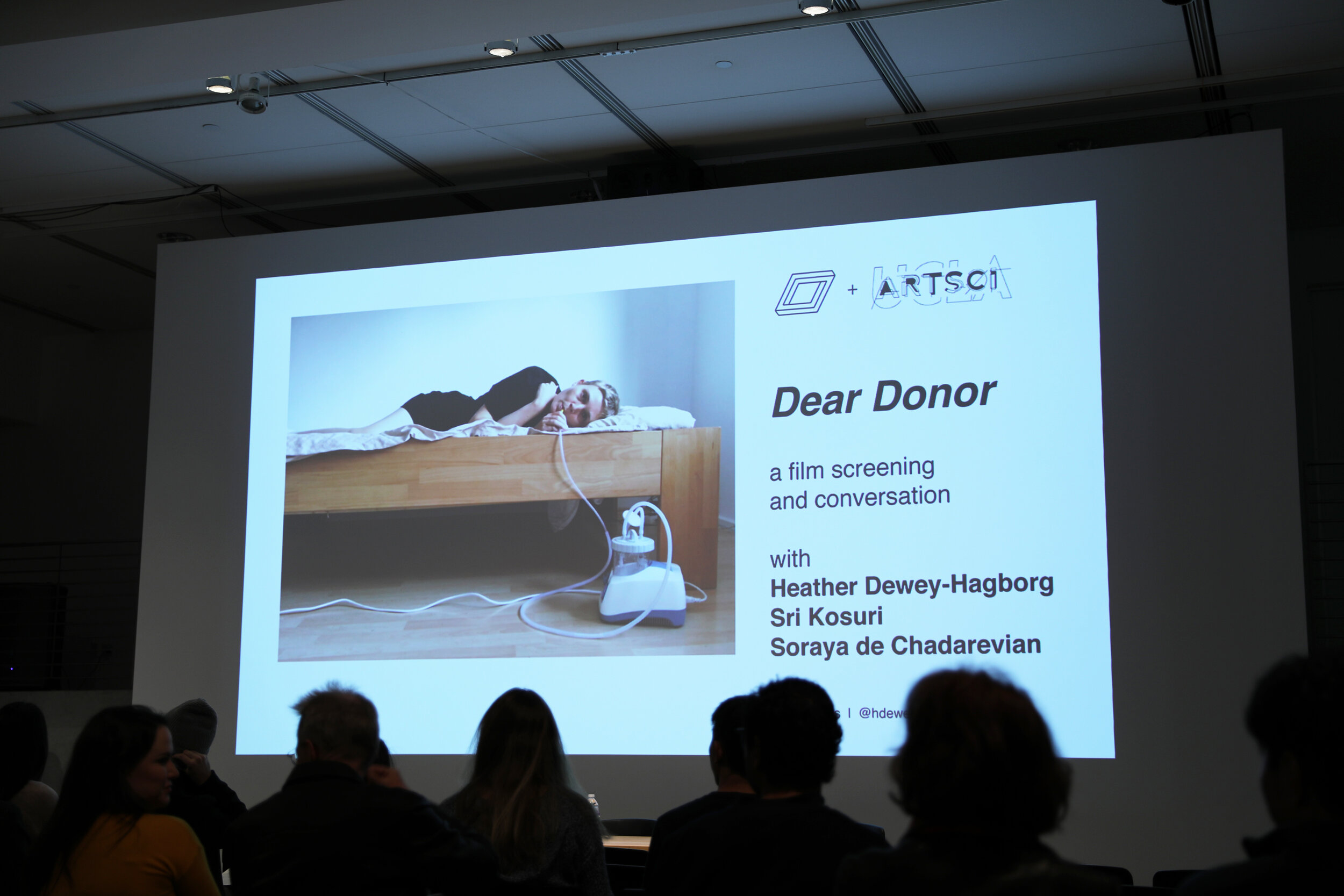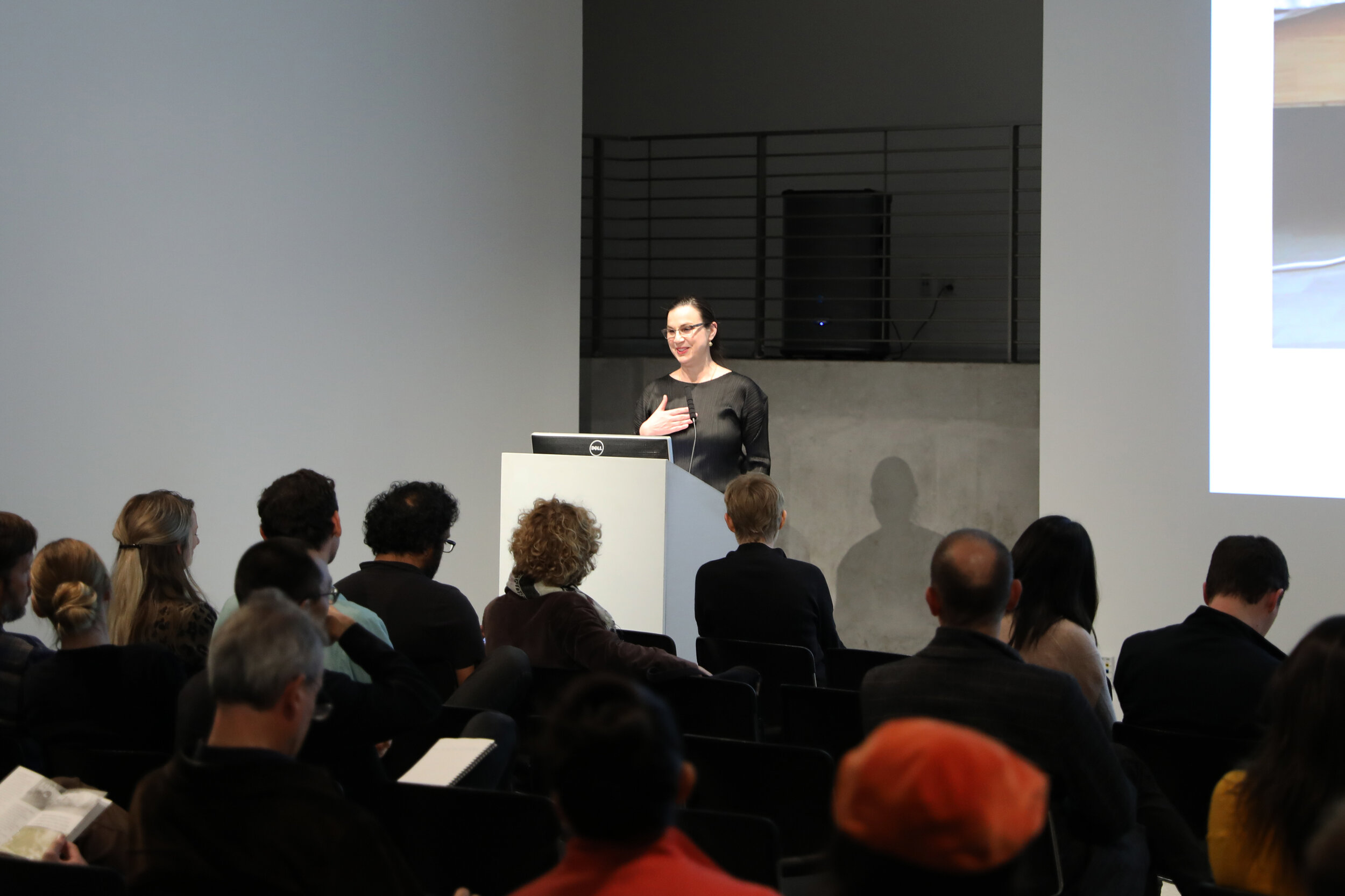DEAR DONOR
A film screening and conversation
Friday, Nov. 16
6:30 p.m.
Broad Art Center at UCLA
Heather Dewey-Hagborg, T3511, 2018, film still, 9:04 min. (Heather Dewey-Hagborg and Toshiaki Ozawa)
“To break a cell is to trespass the most intimate of spaces.”
Fathomers and UCLA Art|Sci Center invite you to join us for “Dear Donor,” a manifold consideration of the intimacies to be revealed in genomic data.
Artist Heather Dewey-Hagborg will screen a single-channel version of her short film T3511 (2018, 9:04 min.), a “post-genomic love story” that follows a biohacker’s increasingly obsessive interactions with an anonymous saliva donor. The work had its premiere as a four-channel installation at MU Artspace, in Eindhoven, in May 2018.
Then the artist will be joined in conversation by bio-engineer Sri Kosuri, whose lab develops technologies for editing DNA; and science historian Soraya de Chadarevian, who studies the material and visual practices of the biomedical sciences. Possible points of discussion: citizen sleuthing; the rise of consumer genomics; chromosomes, as viewed through a microscope.
The event takes place at 6:30 p.m. Friday, Nov. 16, 2018, at the Experimental Digital Arts space at the Broad Art Center at UCLA (240 Charles E. Young Drive North). It is free and open to the public.
For more information, visit the event page here.
Fathomers thanks the Andy Warhol Foundation for Visual Art for its 2018-2019 program support.
ABOUT THE SPEAKERS
Heather Dewey-Hagborg is a transdisciplinary artist and educator whose controversial bio-political projects include Stranger Visions, in which she created portrait sculptures from analyses of genetic material (hair, cigarette butts, chewed-up gum) collected in public places. She exhibits internationally, having shown at the World Economic Forum, the Shenzhen Urbanism and Architecture Biennale, the Van Abbemuseum, Transmediale, and PS1 MOMA, and her work is held in the public collections of the Centre Pompidou, the Victoria and Albert Museum, and the New York Historical Society, among others. Dewey-Hagborg has a PhD in Electronic Arts from Rensselaer Polytechnic Institute. She is artist-in-residence at the Exploratorium, in San Francisco; artist fellow at AI Now; an affiliate of Data & Society; and co-founder and co-curator of REFRESH, an inclusive and politically engaged collaborative platform at the intersection of art, science and technology.
Sri Kosuri is an assistant professor in the department of chemistry and biochemistry at UCLA, where his laboratory develops technologies for reading, writing and editing DNA. Previously a member of the Advanced Technology Team in the Synthetic Biology Platform at the Wyss Institute, Kosuri earned an ScD in biological engineering at MIT, working in Drew Endy's lab, and completed postdoctoral research in George Church’s lab in the department of genetics at Harvard Medical School. He also co-founded OpenWetWare, a platform to promote the sharing of information among bio-researchers and bio-engineers.
Soraya de Chadarevian is a Professor in the department of history and at the Institute for Society and Genetics, both at UCLA. With backgrounds in biology, philosophy, and the history of science, de Chadarevian is interested in the material and visual practices of the biomedical sciences and the place of these sciences in the broader culture, as well as in historiographical issues, including the question of sources for the history of science. She has worked extensively on the history of molecular biology and the complex cultural processes that contributed to the development of the new science after World War II. She is currently completing a book manuscript on chromosomes (as viewed through the microscope), visual evidence, and the study of human heredity in the second half of the 20th century.
ABOUT THE PRESENTERS
Fathomers is a creative research institute dedicated to producing sites and encounters that challenge us to live and act differently in the world. As the successor to Grand Arts (1995-2015) — the influential project space that produced the Propeller Group’s A Universe of Collisions, William Pope.L’s Trinket, and Tavares Strachan’s Orthostatic Tolerance, among many others — we cultivate the ideas of diehard dreamers, commission projects that seem far-fetched, and enlist expansive thinkers across disciplines to redefine the limits of scale, scope and support for artist-led projects. We do this because we value discoveries made absent predetermined outcomes, and we believe in the power of the realized dream as a model for visionary change.
The UCLA Art|Sci Center is dedicated to pursuing and promoting the evolving “Third Culture” by facilitating the infinite potential of collaborations between (media) arts and (bio/nano) sciences. Through the UCLA School of the Arts and Architecture’s Design Media Arts Department and the California NanoSystems Institute (CNSI), the center supports visiting research scholars and artists-in-residence from around the world. Through various lectures, mixers, and symposia, artists and scientists are brought together in order to mesh these cultures and inspire individuals to think about art and science as interrelated and a very relevant synergism of society.
DOCUMENTATION
Photo: Fathomers










